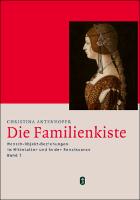Die Familienkiste, Band 1: Mensch-Objekt-Beziehungen im Mittelalter und in der Renaissance
Author(s)
Antenhofer, Christina
Collection
Austrian Science Fund (FWF); AG UniversitätsverlageLanguage
GermanAbstract
Golden crowns, precious relics or rare gifts – it is such treasures that we paradigmatically associate with the Middle Ages, while we think of the Modern Age as the beginning of consumer culture and collections. This book starts from this dichotomy and tells a different story of material culture of the Middle Ages and the Renaissance, in which not the things are at the heart of interest but their capacity to build relationships. In the metaphor of the family chest the book captures the meaning that objects have for individuals and families across generations, times and spaces, while it writes a cultural history of administration that offers new perspectives on changes and continuities in the handling of objects until the present.
Volume 1: https://e-book.fwf.ac.at/o:1721
Volume 2: https://e-book.fwf.ac.at/o:1722 Ob goldene Kronen, kostbare Reliquien oder wertvolle Gaben – es sind Schätze, die paradigmatisch mit dem Mittelalter verbunden werden, während die Moderne als Beginn von Konsumkultur und musealen Sammlungen gilt. An dieser Unterscheidung setzt das Buch an und erzählt eine andere Geschichte der materiellen Kultur des Mittelalters und der Renaissance, in der nicht die Dinge Kern der Betrachtung sind, sondern ihre Fähigkeiten, Beziehungen zu stiften. Ausgehend von den deutsch-italienischen fürstlichen Eheverbindungen des 14. und 15. Jahrhunderts wird nach Emotionen, Praktiken und Diskursen gefragt, die Menschen und Dinge zusammenbringen. Schatz und Gabe, Sammlungen und Konsumkultur, Wahrnehmungen und Kulturkontakte, Systematisierung und Wissensorganisation, Frauen- und Männerhabe, Inventare und deren Entwicklung sind Themen dieser Geschichte der Mensch-Objekt-Beziehungen. Untersucht werden Spuren von Dingen der Häuser Visconti, Sforza, Gonzaga, Württemberg, Wittelsbach, Habsburg, Tirol und Görz. Inventare, Testamente, Eheverträge, Briefe, historiographische Quellen und materielle Relikte erschließen die Bedeutung von Objekten für Individuen wie auch für Familien. Von den exquisiten Goldschmiedearbeiten bis zur Nähnadel mit Zwirn reicht das Panorama dessen, was als Ding betrachtet wird. Mit dem Blick auf Expertinnen und Experten der Administration und des Kunsthandwerks schreibt das Buch zugleich eine Kulturgeschichte der Verwaltung und eröffnet neue Perspektiven auf Wandel und Kontinuitäten im Umgang mit Dingen bis zur Gegenwart.
Band 1: https://e-book.fwf.ac.at/o:1721
Band 2: https://e-book.fwf.ac.at/o:1722


 Download
Download